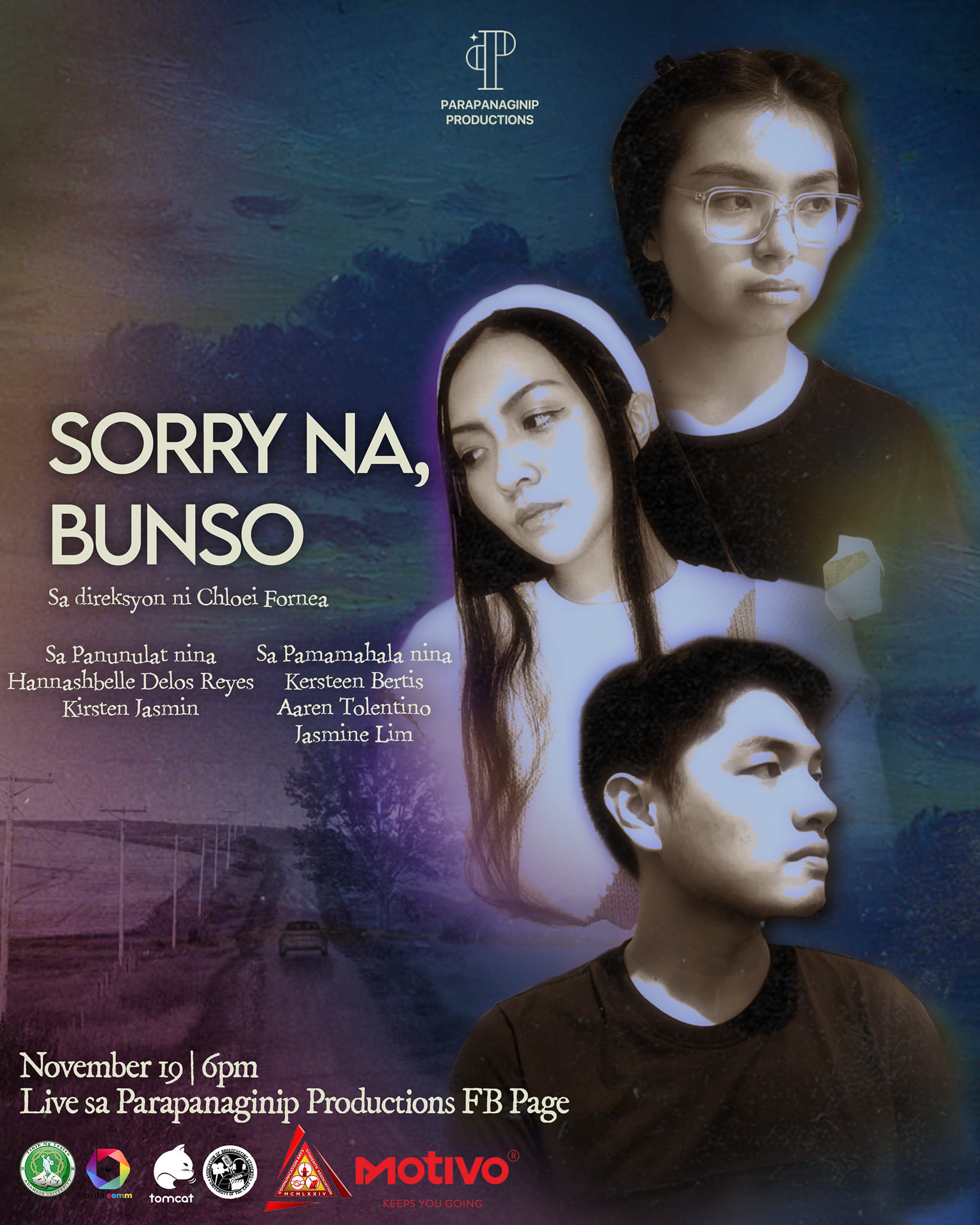by HJADOEYA V. CALICA and MARIA ALTHEA V. JAVIER

SUPERIORITY IN a household often yields barriers to the propagation of openness and healthy relationships. Combined with their desires to be heard, the parties involved tend to push each other away, causing familial bonds to break into pieces and lose stability.
Under the Parapanaginip Productions, Sorry na, Bunso, with its lightweight narrative, walked the audience through the constricting walls of dystopian plots towards the evocative avenue of compelling presentations. The play was directed by Chloei Fornea and written by the timely narrations of Hanashbelle Delos Reyes and Kirsten Jasmin.
In their debut performance, Chelsea Derla, Isabelle Calzado, and Vathan Felicen gave life to three main characters on their journey in addressing the predicaments they faced as adults, students, and siblings.
The narration follows Ellie (Chelsea Derla), the eldest child in the Dela Vega, juggling the creation of a harmonious environment for her youngest sister, Althea (Isabelle Calzado), while seeking ways out of her own complex situation. They attempt to have better communication and resolve traumas—unbeknownst to them—that are plaguing their familial relationship.
In the preceding parts of the play, Althea is seen concerned about Ellie’s dependence on sleeping pills. Such unhealthy habit causes tension to arise between the two sisters, leading to Ellie discrediting Althea’s hardship as a college student. Provoked by the distress from responsibilities, alongside the secret she kept from her sibling, Ellie finds herself on the verge of peril.
Sorry na, Bunso thrived in detailing an issue close to many Filipinos’ hearts. As it is quite reminiscent of the familiar soap-opera setup, there is a reintroduction of eldest siblings as the secondary parents to their hard-headed younger siblings, the great walls against generational trauma, and bearers of financial, emotional, and social responsibilities. The stereotypes confining the image of eldest siblings in a Filipino household is also seen in the narration. Oftentimes, eldest siblings are heard and followed by their younger siblings whose opinions are commonly unheard, provoking doubts about the position that younger siblings hold.
But in the rise of conflicts, the middle child is often seen as the middle ground, like how Nate (Vathan Felicen) becomes Althea’s moral compass whom she usually seeks help from. But as the play progresses, it is also noticeable how Nate’s character can be detrimental towards Ellie as he invalidates her struggles with sleeping pills. His character became unclear whether he is pivotal in the ordeals of Ellie and Althea.
Meanwhile, Althea’s predicament as the youngest child also captured the struggles of a typical youngest sibling in a Filipino household. Despite not bearing similar responsibilities as Ellie, she is riddled in understanding her family’s problem while fulfilling her responsibilities as a student.
Sorry na, Bunso took the initiative to capture both worlds—not dismissing one end to validate the other. This allows Ellie to reveal the recurring struggles with her responsibilities and gradually recognizing Althea’s presence in their household, and eventually find a resolution.
While the narration captures the core experiences of a typical household, deficiencies in the technical aspect hindered engagement. Throughout the play, the background music made it difficult to hear the characters, especially Nate. Meanwhile, his lines and setting vaguely represented his relevance in the play, seemingly inserted to incite conflict, lacking a compelling execution.
Some of the actors were unable to freely express due to the setting. For instance, Ellie’s room—which looked uplifting rather than gloomy—did not complement her worries. Moreover, Ellie and Althea resort to over-the-top gestures instead of standing up and projecting dominance during the momentum of tension.
Despite such lapses, it did not hinder the actors’ performance in giving the viewers a raw artistic representation of the struggles faced by many Filipino siblings. Although the impression it marked to the viewers was a fleeting moment to ponder, the play is still successful in its display of familiarity. It resolved one of the many toxic Filipino cultures until the very end: refusal for reconciliation.
Sorry na, Bunso was an eye-opener to society as it demonstrates the need to destroy power dynamics in a household, knowing how these give way to physical, emotional, and relationship deficiencies. Althea and Ellie’s quest for stability revealed ugly truths about Filipino households which are yet to be addressed. F



